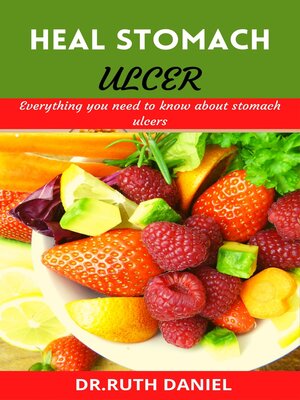Heal Stomach Ulcer
ebook ∣ Everything you need to know about stomach ulcers (How to heal, manage and cure stomach ulcers).
By Dr. Ruth Daniel

Sign up to save your library
With an OverDrive account, you can save your favorite libraries for at-a-glance information about availability. Find out more about OverDrive accounts.
Find this title in Libby, the library reading app by OverDrive.



Search for a digital library with this title
Title found at these libraries:
| Library Name | Distance |
|---|---|
| Loading... |
Ulcers are sores that can develop in different parts of the body.
Gastric ulcers, or stomach ulcers, develop in the lining of the stomach. They are very common, affecting between 2.4–6.1% of the population
Various factors that disrupt the balance your stomach's environment can cause them. The most common is an infection caused by the Helicobacter pylori bacteria
Conventional anti-ulcer treatment typically relies on medications that can cause negative side effects like headaches and diarrhea.
The stomach produces a strong acid to help digest food and protect against microbes. To protect the bodily tissues from this acid, the stomach also secretes a thick layer of mucus.
If the mucus layer is worn away and stops functioning effectively, the acid can damage the stomach tissue, causing ulcers.
Stomach ulcers are relatively easy to cure, but they can cause significant problems if left untreated.
Dietary changes can help prevent stomach ulcers from developing.
People at risk of stomach ulcers should include more of the following nutrients in their diet:
Fruit and vegetables: Eating a variety of fruit and vegetables is key to a healthy digestive tract lining. These foods are rich in antioxidants, inhibit acid secretion, and contain cytoprotective and anti-inflammatory properties. A 2017 study states that these are all important factors for preventing and treating ulcers.
Fiber: Diets high in soluble dietary fiber reduce the risk of developing stomach ulcers.
Probiotics: Food that contains active bacterial content, such as probiotic yogurt, can help reduce a Helicobacter pylori (H. pylori) infection. Probiotics have been shown to slightly improve symptoms of indigestion and the side effects of antibiotics.
Vitamin C: This powerful antioxidant may be effective in helping eradicate H. pylori, especially when taken in small doses over an extended period. Fruit, legumes, and vegetables, such as oranges and tomatoes, contain high levels of vitamin C.
READY TO DISCOVER MORE?
GRAB A COPY TODAY







